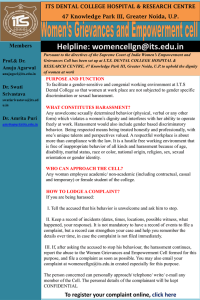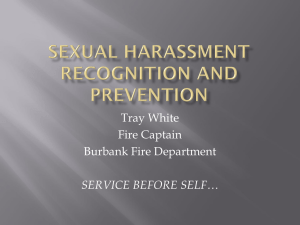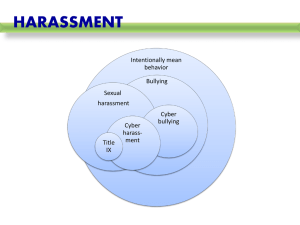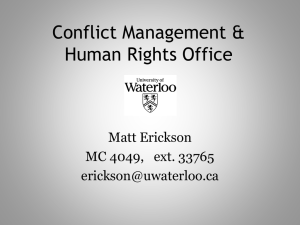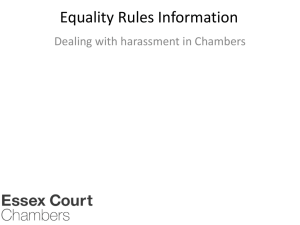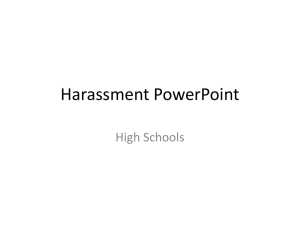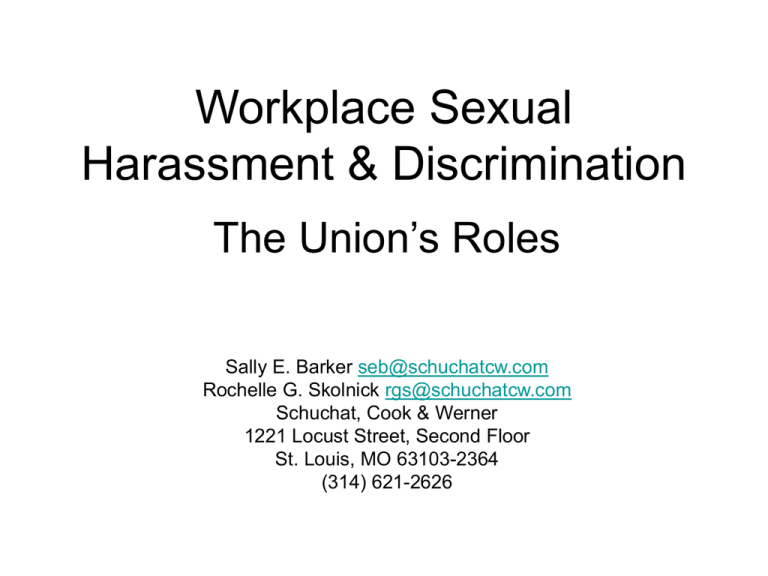
Workplace Sexual
Harassment & Discrimination
The Union’s Roles
Sally E. Barker seb@schuchatcw.com
Rochelle G. Skolnick rgs@schuchatcw.com
Schuchat, Cook & Werner
1221 Locust Street, Second Floor
St. Louis, MO 63103-2364
(314) 621-2626
Sources of Law
• Federal, state and some municipal laws prohibit
discrimination and harassment on the basis of
sex and other protected characteristics.
– Title VII of the Civil Rights Act of 1964
– Missouri Human Rights Act, Illinois Human Rights Act
and other state-specific statutes
– Federal and Missouri statutes do not protect against
discrimination based upon sexual orientation, but
some state and city (e.g. St. Louis City) laws do
• Administered by Equal Employment Opportunity
Commission (EEOC) and state (and in some
cases municipal) agencies.
2
Duty of Fair Representation
• In addition to complying with government
anti-discrimination laws, Unions also have
a duty to fairly represent their members
under federal labor law. A Union breaches
this duty when it treats a member
differently because of the member’s sex or
any other protected characteristic.
– In addition to sex, protected characteristics
include race, age, national origin, religion, and
certain disabilities.
3
What is Sexual Harassment?
• A form of unlawful sex discrimination that
occurs when unwelcome sexual conduct is
so severe or pervasive that it
unreasonably interferes with work
performance or participation in union
activities.
• The law recognizes two types:
– Quid pro quo (this for that)
– Hostile environment
4
Quid Pro Quo Harassment
• Demands for sexual conduct in exchange for
some benefit to the member/employee
– Submission to such demands is made an
explicit or implicit condition of continued
employment or union membership
– Submission to or rejection of such demands is
used as a basis for decisions about
employment status or union membership
• Promotion, transfer to desirable job assignment,
overlooking failure to pay dues
• Discharge, demotion or refusal to give job referrals
5
Hostile Environment Harassment
• Unwelcome, offensive conduct of a sexual
nature that is severe or pervasive enough that it
interferes with a reasonable person’s ability to
work or to participate in union activities.
Examples:
– Comments, jokes or verbal abuse of a sexual nature
– Displays or e-mails of pornography
– Repeated unwelcome requests for dates or sexual
favors
– Offensive physical touching of any body part or
interfering with an employee's ability to move.
6
What is “unwelcome” sexual conduct?
• The employee did not invite or incite it and
regards it as offensive
• Best evidence conduct is unwelcome is an
employee complaint or protest made at the time
of the conduct
• Conduct may be unwelcome even if the
employee submits to it
• When employee uses vulgar language or
initiates sexually-oriented conversations with coworkers, it may be evidence that sexual conduct
from the same co-workers was not unwelcome
7
Remember…
• A harasser may be a man or a woman, and harassment
may be directed toward a member of the same or the
opposite sex.
• A harasser can be anyone connected to the work or
union environment: supervisor, manager, co-worker,
customer, supplier, or vendor.
• Employees/members who are not the target of the
harassment, but who observe and are offended by it may
still be victims of the harasser’s conduct.
• Consensual socializing, minor incidents, isolated stray
remarks, bad taste and rudeness do not constitute
unlawful harassment.
8
The Union’s Roles in Combating
Harassment & Discrimination
• Bargaining and enforcement of
collective bargaining agreements
• Representation of member/employee
who complains of harassment or
discrimination
• Administration of union membership,
hiring hall or apprenticeship program
• Employer of union staff
9
Union Policies Against Unlawful
Discrimination & Harassment
• To fulfill all of these roles, it is useful for a Union
to adopt policies prohibiting unlawful harassment
and discrimination and implementing procedures
for dealing with complaints of harassment or
discrimination by Union staff and members.
• The Union should distribute the policies and
educate staff, stewards and members about
their obligations under the policies and the law.
10
Union’s Role in CBA
Negotiations & Enforcement
• Most CBAs contain non-discrimination clauses.
• If the employer does not already have a policy
on sexual harassment and discrimination, the
Union should urge the employer to develop one.
• Union can also urge the employer to hold
training sessions to make supervisors and
employees aware of its sexual harassment and
discrimination policies and the law.
11
Union’s Role in Responding to
Harassment Complaints and Discipline
• The Union may be called upon to represent a
member who complains of harassment by a
supervisor or co-worker who is not a member of
the union.
• The Union may also be called upon to represent
a member who complains of harassment by a
fellow member.
– This situation poses potential conflict of interest
problems for the Union
• The Union may be called upon to represent a
member who has been disciplined for sexual
harassment.
12
If a member complains of
harassment on the job…
• Remember that it is the employer, not the union, that is
in control of the workplace and therefore primarily
responsible for preventing sexual harassment and
discrimination on the job. The Union’s principal role is to
help members when the employer has not effectively
corrected meritorious complaints of discrimination and
harassment.
• If the alleged harasser is not a bargaining unit member,
tell the complainant to follow the employer’s procedure
for complaining about harassment.
– If the employer does not respond appropriately to the complaint,
the Union can file a grievance.
13
If the alleged harasser is a bargaining
unit member…
• The Union can try to resolve the matter
informally.
• If that approach does not work or is
inappropriate due to the seriousness of the
alleged conduct, the Union should advise the
victim to follow the employer’s procedure for
complaining about harassment.
– If the employer does not respond appropriately to the
complaint, the Union can consider filing a grievance.
– However, when both accuser and accused are
members of the bargaining unit, the Union can and
should fairly investigate both members’ claims before
deciding whether and how to pursue any grievance.
14
Investigating Complaints
• Make a plan for the investigation based on what you know at the
start; begin it as soon as possible; adjust the plan as you get
additional information.
• Assign a person trained in conducting an investigation to be the
investigator. The investigator should not have a close relationship
with either the alleged victim or accused. Involve an outside
investigator and/or attorney in appropriate, complex situations.
• Set up a file to collect all documents and interview notes from the
investigation.
• Safeguard confidentiality by discussing the complaint with others
only to the extent necessary to conduct a full and fair investigation.
– However, do not agree to keep any complaint “off the record.” A union
has a duty, whether as advocate or employer, to fully investigate any
complaint of sexual harassment and take appropriate action.
• When the investigation is complete, tell the complainant and those
accused of harassment what the outcome of the investigation was.
15
Investigating Harassment Between Members
• Interview the complainant and have him/her complete a grievance
fact sheet.
• Notify bargaining unit member(s) accused of harassment about the
complaint and interview them.
• Interview witnesses named by complainant or accused.
• After investigation is complete, make a fair and objective evaluation
of the merits of the grievance.
– Assess credibility of statements of both complainant and accused
harassers
– Assess whether conduct alleged was severe enough to interfere with
the complainant’s working conditions
– Assess whether employer failed to take reasonable corrective action.
• Remember that the grievance is against the employer, not the
individual member, for failing to take action to stop the harassment.
16
Interviewing the Complainant
• Reassure the complainant that s/he has a right to file a
complaint.
• Ask whether the employer has been informed of the
complaint, and if not, explore doing so.
• Explain how the union will procedure (e.g. conduct an
investigation). Do not promise a grievance or other
action at this stage.
• Discuss the possibility of retaliation. Assure the
complainant that the union will not tolerate retaliation
from other members.
• Ask the complainant to tell you immediately about any
retaliation or ongoing harassment s/he experiences.
• Listen carefully and respectfully. Take notes and add
them to the investigation file.
• Ask the complainant to fill out a grievance fact sheet.
17
Questions for the Complainant
Follow up grievance fact sheet with specific questions. Examples:
•
•
•
•
•
•
•
•
Who, what, when, where, and how: Who committed the alleged
harassment? What exactly occurred or was said? When did it occur,
and is it still ongoing? Where did it occur? How often did it occur?
How did you react? What response did you make when the incident(s)
occurred or afterwards?
How did the harassment affect you? Has your job been affected in any
way?
Are there any persons who have relevant information? Was anyone
present when the alleged harassment occurred? Did you tell anyone
about it? Did anyone see you immediately after episodes of alleged
harassment?
Did the person who harassed you harass anyone else? Do you know
whether anyone complained about harassment by that person?
Are there any notes, physical evidence, or other documentation
regarding the incident(s)?
How would you like to see the situation resolved?
Do you know of any other relevant information?
18
Interviewing the Alleged Harasser
• Tell the alleged harasser that a complaint has
been filed.
• Assure him/her that the Union will make a full
and fair investigation.
• Remind the alleged harasser that retaliation
against the complainant is unlawful and will not
be tolerated.
• Listen carefully and respectfully to the alleged
harasser just as you did to the complainant.
19
Questions for the Alleged Harasser
• What is your response to each of the
allegations?
• If the harasser claims that the allegations are
false, ask why the complainant might lie.
• Are there any persons who have relevant
information?
• Are there any notes, physical evidence, or other
documentation regarding the incident(s)?
• Do you know of any other relevant information?
20
Interviewing Witnesses
• What did you see or hear? When did this occur?
• Describe the alleged harasser's behavior toward
the complainant and toward others in the
workplace.
• What did the complainant tell you? When did
s/he tell you this?
• Do you know of any other relevant information?
• Are there others who have relevant information?
21
Representing a member disciplined for
sexual harassment
• The Union may have a duty to pursue a
grievance for a member who has been
disciplined by the employer for
harassment.
• But success on the alleged harasser’s
grievance may adversely affect the
complainant’s employment, so the Union
should not automatically pursue such a
grievance without careful evaluation.
22
Evaluating the grievance of a member
disciplined for harassment
• Interview the grievant and ask him/her to complete a
grievance fact sheet.
• Interview the member who complained of harassment
and any witnesses.
• Once investigation is complete, evaluate the grievance
considering the following:
– Credibility of competing factual claims of members involved
– Competing interest of grievant and member who accused
him/her of harassment
– Grievant’s potential due process defenses, even if s/he did
engage in objectionable conduct, such as:
• Lack of employer training on meaning of sexual harassment
• Principle that punishment must fit the offense
• Failure to follow progressive discipline, if appropriate
23
Preventing Union Liability for Sexual Harassment
•
•
•
•
•
•
•
•
•
•
•
•
Understand that you have an important role to play in preventing union liability for
unlawful sexual harassment.
Read the union’s policy and make sure others understand it.
Understand that the union’s policy protects Union employees and Union members
from sexually harassing conduct by other Union employees and Union members at
the Union hall and while engaged in Union activities.
Do not ignore complaints about offensive conduct.
Listen carefully to the details of the complaint and how the person complaining feels
about the conduct.
Do not jump to conclusions about the complaint or judge the complaint by how you
feel about the conduct. Keep an open mind.
Remember that conduct that may be okay in an all male construction site, may be
offensive to women employees or members and interfere with their work or
participation in union activities.
Treat the complaint confidentially by discussing it only with those who need to know
in order to conduct a fair investigation.
Do not promise to keep a complaint “off the record.” The Union has a responsibility to
the complaining party and the accused to conduct a fair investigation and take
appropriate action.
Investigate the complaint fairly by getting all sides of what happened.
If the complaint has merit, take only the corrective action that is appropriate to resolve
it. Counseling and progressive discipline can be appropriate for less serious kinds of
sexual harassment.
Tell the person who complained and those accused the outcome of the investigation.
24


